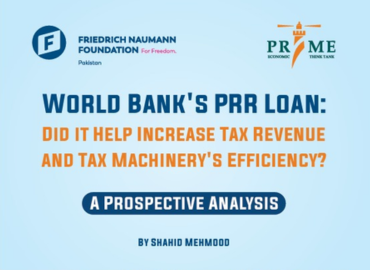Executive Summary
Federal and provincial governments in Pakistan have shown a lukewarm attitude in restructuring the country’s tax system to achieve efficiency, equity and to promote economic growth. Complex tax codes, complicated procedures, reliance on easily-collectable indirect taxes, weak enforcement, inefficiencies, incompetence and corruption are main factors for low tax collection.
Instead of broadening the tax base and simplifying laws, federal and provincial governments offer amnesties, immunities, tax-free perks and perquisites to powerful segments of society. As a result of this policy mindset, ordinary businesses and citizens suffer. This paper argues radical revamping and restructuring of the entire tax system, suggesting flat, low, broad and predictable taxes.
Tax reforms undertaken to date, have mainly been patchwork, and proven to be an exercise in futility. Tax reform commissions and consultative committees, constituted for reforming the system, have proven to be unsuccessful as they have been suggesting remedies for curing the incurable or otherwise curing symptoms rather than addressing the causes.
The so-called reforms, including World Bank-funded six-year-long Tax Administration Reforms Project (TARP), have failed to encourage people towards voluntary tax compliance. The number of tax filers has fallen significantly since 2003. The only viable option for meaningful change is to replace the existing tax system with low, flat and a predictable tax system that is simple, pragmatic, growth-oriented, and broad-based.
With such a system in place, those who are not into the tax net or who avoid true disclosures would be induced to pay their taxes voluntarily. This should be coupled withtransparent and quality spending of taxpayers’ money for welfare of society as a whole and incentivizing growth and economic well-being of every individual.Presently, taxpayers have to deal with multiple tax agencies adding to their cost of doing business. A well-equipped, automated and efficient tax agency is imperative to facilitate the citizens for discharging their tax obligations through one-window operation and also to disburse to all tax-related benefits (pensions, social security, income support etc.). The non-existence of tax-related benefits is the most neglected area of our discourse on reforms.
The existing four-tier tax appellate system has also failed to deliver. The problems faced by taxpayers in appeals/references speak volumes of the ineffectiveness of various judicial forums that have been assigned the statutory obligations to safeguard them against unjust imposition of taxes. The revenue authorities are also unhappy with the tax appellate system as litigations take years for the settlement of tax disputes. Therefore, in order to make the appellate system more responsive, the existing tax tribunals dealing with direct and indirect taxes to be restructured.
This paper proposes a two-tier tax appellate system where first appeal goes to National Tax Tribunal with the right of another appeal in the form of intra court appeal. Subsequently, if any substantial question of law needs consideration, it can be referred to the Supreme Court by way of leave to appeal. This will help in achieving uniformity of decisions since at present High Courts in different provinces sometimes differ on identical questions of law and it takes years for final authoritative pronouncement by the Supreme Court. The two-tier tax justice system can ensure expeditious settlement of tax disputes, preferably within a year’s time of first order.
Income taxation at the moment is highly complex and fragmented. There is classical taxation under various heads of income, while many transactional taxes, presumptive and minimum taxes have been added to distort the entire concept of personal income taxation. This paper suggests simple and flat rate taxation of 10 percent for all entities other than companies, for which a flat rate of 20 percent is proposed.
The right to levy sales tax on goods rests with the federal government and that on services lies with the provincialgovernments. Presently, federal sales tax on goods is fraught with exemptions, multiple rates (from 17% standard rate toabout 70% on high diesel oil) and complicated procedures for various kinds of goods. The same position prevails with the provincial tax codes where telecommunication services are taxed at 19.5 percent in addition to 14 percent advance income tax paid by the subscribers. This kind of harmful taxation is anti-growth and anti-investment.
This paper proposes single-stage, single-digit sales tax on goods by federal government at the rate of 5 percent across the board with no exemption, albeit exporters shall have zero-rated regime. The only exemption shall be on food, life saving drugs, books, children’s garments and educational equipments. Provinces can also consider imposing harmonised sales tax (HST) at the same rate on services, details of which requires a separate study.
Under the current customs law (Customs Act, 19691), exemptions/concessions are granted to goods that are imported into Pakistan through Statutory Regulatory Orders (SROs). There are about 5,000 effectively traded tariff lines. However, SROs, covering nearly 84 percent of those tariff lines and impacting 45 percent of imports across almost all sub-sectors, have been issued over the course of years. The SRO-based customs policy has rendered the actual tariff different from the standard tariff.
As a result of this, customs tariff have multiple rates and several exemptions, and various “conditions and requirements” are to be fulfilled to avail those exemptions. This creates opportunities for the discretionary use of powers by officials, raising the cost of doing business and incentivisingmalpractices and mis-declarations for evading duties. Recognizing these problems, this proposes that there should be a single slab of 5 percent for all imports to end these undesirable practices.
The crux of the paper is this: low, flat, predictable and broad-based taxes, administered through efficient tax apparatus, Pakistan can achieve fairness in taxation system. It will create incentives for better compliance and lead to accelerated economic growth. A paradigm shift is required to restructure the entire tax system to induce more investment, accelerate growth and ensure economic prosperity for the country benefitting all members of society.





